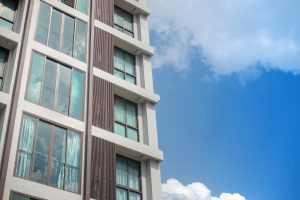By Hannah Gingrich, Living Sustainably Along the Lakeshore

“Affordable housing is not a simple subject” might be the understatement of the year. Regular consumers of local news have undoubtedly noticed this topic repeatedly featured in recent city discussions.
Housing issues affect everyone, though in different ways. Even the casually interested likely have heard friends or coworkers mention how difficult it is to find a place to live or how stressed out they are when faced with an upcoming move, wondering if they will be able to find a situation they can afford.
The next Living Sustainably Along the Lakeshore program will address how housing issues affect us and our neighbors. Four local housing experts will talk about what affordable does and could look like in Ottawa County at “Quality of Life: The Affordable Community,” to be held 6:30 p.m. Tuesday, March 5, at Herrick District Library, 300 S. River Ave.
All kinds of people are significantly affected by the lack of available housing at their price point.
Housing Next’s May 2017 Impact Report, the most recent available, points out the large number in our community who fall in the ALICE category – ALICE, or Asset-Limited, Income-Constrained, Employed.
That threshold is $56,400 for a family of four.

Housing Next is a local initiative seeking to support all income levels needing affordable housing.
Housing Next’s impact report recounts stories of seniors, recent graduates, factory workers, single mothers, and disabled adults struggling to make ends meet.
In one example, Sue and Tom both make $10 an hour working at a factory. They like the area and want to stay, but their monthly income barely meets their expenses. Sometimes it comes down to a choice of what bill gets paid that month – rent or car insurance, day care or food.
In another example, Tamara has a full-time job. As a single mother making minimum wage, she was forced to look for more affordable housing when her work hours became erratic. However, she couldn’t find anything near work and had to rent an apartment half an hour away, despite being concerned about her car’s reliability. She must now spend much of her budget on transportation.
Housing and homelessness aren’t simply issues of poverty. Jobs paying low wages may not have been intended for individuals supporting families, but that situation has become the new reality. How do you manage to live a life of quality when your paycheck barely covers the roof your head?
But building affordable housing doesn’t come cheap.
It might seem like a simple matter of budgeting a building to keep it low-cost. But not only does an affordable housing development require the same real estate purchases, zoning approvals, and building expenses as market-rate rentals, it often comes with additional challenges. Neighbors may contest building sites, and the grants needed to make projects financially feasible lengthen the process, which
ultimately drives up cost.
 These kinds of issues will be addressed by the panel of experts at the next Living Sustainably program on March 5. Included in the evening will be a drawing for a $20 Lakeshore Habitat for Humanity ReStore gift card
These kinds of issues will be addressed by the panel of experts at the next Living Sustainably program on March 5. Included in the evening will be a drawing for a $20 Lakeshore Habitat for Humanity ReStore gift card
Hannah Gingrich is a public services assistant at Herrick District Library, a Living Sustainably Along the Lakeshore partner.
“Quality of Life: The Affordable Community”
Who: Ryan Kilpatrick of Housing Next; Laura Driscoll, director of housing services at Good Samaritan; Angela Maxwell from Community Action House, and Chad Frederick from the geography department faculty at Grand Valley State University
Where: Herrick District Library, 300 S. River Ave.
When: 6:30 to 8 p.m., Tuesday, March 5
Admission: Free
![]() This Week’s Sustainability Framework Theme
This Week’s Sustainability Framework Theme
Quality of Life: The community, through governmental, religious, business and social organizations, makes decisions that contribute to its own well-being.
![]() ABOUT THIS SERIES
ABOUT THIS SERIES
Living Sustainably is a collection of community voices sharing updates about local sustainability initiatives. It is presented by the Holland-Hope College Sustainability Institute, a joint project of Hope College, the City of Holland and Holland Board of Public Works. Go to www.hope.edu/sustainability-institute for more information.

